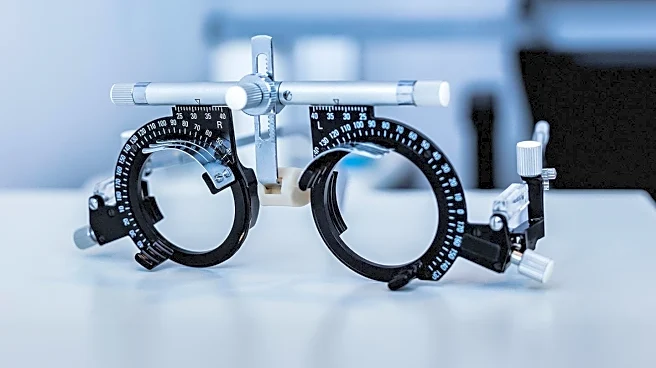What's Happening?
Aurion Biotech has announced positive results from its Phase 1/2 CLARA trial, evaluating the safety, efficacy, and tolerability of AURN001, a regenerative cell therapy for corneal endothelial disease.
The trial demonstrated a clear dose-dependent response, with the greatest efficacy observed in the high-dose group. At 12 months, 65% of subjects in the high-dose group achieved a significant improvement in visual acuity, with no cases of graft rejections or treatment-related serious adverse events. The findings support advancing AURN001 to a pivotal Phase 3 trial, with the potential to restore vision to millions of patients with corneal endothelial blindness.
Why It's Important?
The success of the CLARA trial represents a significant advancement in regenerative medicine, offering hope to patients with corneal endothelial disease, a condition that leads to vision loss and currently lacks effective treatment options. AURN001 utilizes cultured human corneal endothelial cells, potentially transforming a single tissue donation into a mass-scale cell therapy capable of treating millions. This approach addresses the limitations of current treatments, which are constrained by donor shortages, and could revolutionize the field of ophthalmology by providing a scalable solution to corneal blindness.
What's Next?
Aurion Biotech plans to launch a U.S. pivotal Phase 3 trial in the first half of 2026, further evaluating the efficacy and safety of AURN001. The company has obtained Regenerative Medicine Advanced Therapy and Breakthrough Therapy Designation for AURN001, highlighting its potential to treat corneal endothelial disease. If successful, the therapy could be commercialized, offering a new treatment option for patients worldwide. Researchers and clinicians will continue to explore the capabilities of AURN001, refining its application and improving patient outcomes. The success of this trial may also encourage further investment and innovation in regenerative medicine.
Beyond the Headlines
The development of AURN001 raises ethical considerations regarding the use of cultured human cells and the potential consequences of altering natural processes. As research progresses, discussions around the safety, efficacy, and long-term effects of this approach will be crucial. The findings also underscore the importance of interdisciplinary collaboration in advancing medical technology, combining expertise from ophthalmology, cell biology, and clinical practice to achieve groundbreaking results. The study's implications extend beyond corneal disease, offering insights into the broader field of regenerative medicine and the potential for innovative treatments.











